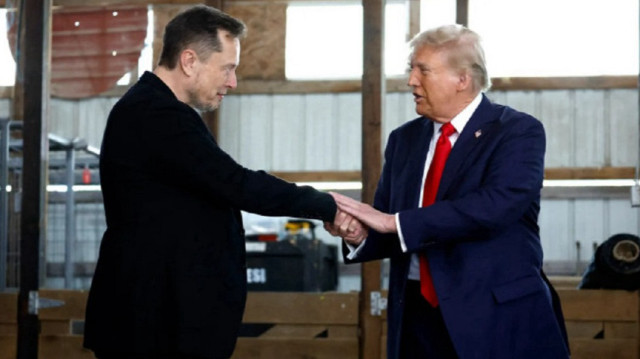
'I feel it is a strategy designed to compound nervousness in allies,' says University of Surrey's Amelia Hadfield
- 'I would agree that Musk and Trump pose the greatest example of a threat of foreign interference,' academic tells Anadolu
- 'If the liberal democratic order does not take it seriously, then we will see the death of the rules-based liberal democratic order,' says Hadfield
US President-elect Donald Trump and his close ally billionaire Elon Musk are the "greatest example of a threat" of foreign interference, said a British expert, who warned that the rules-based liberal democratic order is under a huge risk of "death."
The Tesla and SpaceX CEO, who is set to serve as an advisor to Trump, has come under harsh criticism for his meddling in European politics through his X platform.
He has made controversial remarks about the political matters of European countries including Italy, Germany and the UK and has also come under strong criticism from Germany's political establishment over his support for the far-right Alternative for Germany (AfD) party ahead of a snap election in February.
Amelia Hadfield, head of the politics department at the University of Surrey, described the issue as a “social media rampage,” saying Musk has taken aim at governments and has a targeted focus on usually a particular individual.
"It's sort of a forensic attack when you drill down into it, but it's also very widespread. It's very spread across in terms of who his approaches seem to be targeted on."
She noted that it feels as if these "taunts are really quite deliberate" and sort of "manipulative" on the one hand and designed to "provoke," while on the other hand, he's well aware that he's not merely involving himself but interfering.
"I feel there is going to be a ramp-up between now and the presidential inauguration on the 20th of January. So I feel it is a strategy designed to compound nervousness in allies and perhaps jangle even more nerves in countries who are not sure whether they're an ally or not," she added.
- 'Complicated times for EU'
Hadfield said that on Jan. 20, Musk will no longer be just a multi-billionaire and huge tech entrepreneur but also part of Trump's presidential cavalcade, meaning it will complicate even further how the West is going to be able to deal with him.
Asked about the possible state of US-Europe relations with Trump's inauguration as the 47th president later this month, Hadfield said she believes ties could be strained.
"I think not only because Musk has taken aim at a number of European countries -- France and Germany are the best examples, but also, more broadly, the United Kingdom -- but I think the European Commission is feeling that he has been deliberately not just interfering but inflammatory."
She noted that Musk expressing support for the AfD on X and his recent discussion with the party's leader, Alice Weidel, put pressure on the European Commission as well as European governments "because the commission is in charge of enforcing Europe's Digital Services Act, the digital rule book, if you like, and the point of that act is to police and to enforce social media platforms.”
Pointing out that for breaches of those platforms, including interference, there are huge fines, she added that the European Commission is in a position to consider whether it can take on a platform as large as X on the basis of having given a party like the AfD an unfair public advantage over its rivals before a vote.
However, she noted that political willingness as well as technical evidence is needed to be able to prosecute Musk, saying these are complicated times for the European Union, especially once he is part of the Trump administration.
- 'Greatest example of a threat of foreign interference'
Turning to Trump's "repeated threats" of a trade war with Europe, she noted it would be particularly damaging for Germany and German exports if a tariff as high as 20% is imposed.
"So I think there's real worry, and that can only be countered by very real pushback as well."
She said the question in this case is whether Musk is being "goaded by Trump" to undermine centrist parties across Europe as a whole.
Hadfield added that Germany is a very good example of that as a case study of "attempting to normalize" far-right parties like the AfD and playing down their radicalism.
She noted that there have been spats with France, but it hasn't "quite evolved or dissolved."
For her, Italian Prime Minister Giorgia Meloni has played "very canny games" thus far, as indeed, she has with a lot of the EU by trying to onboard aspects of Musk "but not encouraging him to explicitly align himself with elements that would make him appear even more difficult to deal with."
"I would agree that Musk and Trump pose the greatest example of a threat of foreign interference. At the same time, I do feel that much of it is taunt based, bullying based. It's distinctly performative."
She said that more broadly, it is aimed at the liberal democratic order.
"If the liberal democratic order does not take it seriously, then we will see the death of the rules-based liberal democratic order. So the stakes, frankly, could not be higher," she added.
Hello, the comments you share on our site are a valuable resource for other users. Please respect other users and different opinions. Do not use rude, offensive, derogatory, or discriminatory language.
The floor is all yours.








